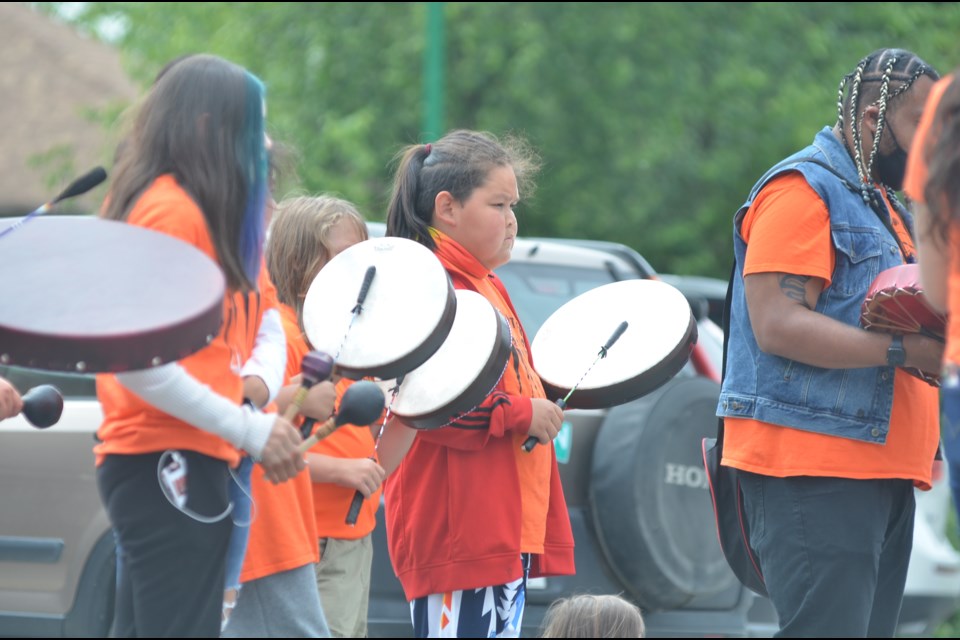A sea of orange could be seen, and drums could be heard outside Tsleil-Waututh Nation School on May 31 as the community gathered for an emotional healing circle.
The gathering, at 3010 Sleil Waututh Road, North Vancouver, was a healing response to the Tk’emlups te Secwépemc First Nation sharing the heartbreaking news that the remains of 215 Indigenous children were found in unmarked graves at the former Kamloops Indian Residential School site with the help of a ground-penetrating radar.
While devastating, the discovery was not a surprise to Tsleil-Waututh Nation Chief Leah George-Wilson, who has heard stories of the atrocities that occurred at the institutions from Elders in the Nation who attended the Kamloops Indian Residential School, including her own mother, as well as those who were sent to St. Paul’s Indian Residential School, which was located on the 500-block of West Keith Road in North Vancouver.
“I think people with an understanding of the history of Indian residential schools were not surprised at such shocking news,” she said.
“I've heard from other leaders and Elders that there has always been a question about who didn't come home from school or who got sent away.”
While the news did not come as a surprise, George-Wilson said it was extremely triggering to Elders who are residential school survivors, and the healing circle was held to support them through this time and to educate students.
“When we came together in the circle, that was to show those Elders that they have support,” George-Wilson said. “It was to show those elders that they aren't alone.”
As part of the healing circle, Elders shared their experiences with students and the community.
“Up until now, in all likelihood, they [survivors] have felt like they have no voice,” George-Wilson said Monday. “They have felt that nobody was listening. Because they told the Truth and Reconciliation Commission there are bodies buried here and that got put in the report, it got put into recommendations, it goes to the federal government ... and nothing. So, today, they felt like they had their voice.”
She said the gathering was also a chance for students to witness the strength within their community.
“It was a great opportunity to have a teaching moment to show the children that this is how our communities support each other,” George-Wilson said. "How we are there for each other."
She said it was important to sit down and have conversations with children, using the appropriate language, to share the history.
The Kamloops Indian Residential School and North Vancouver's St. Paul's Indian Residential School were just two of 18 federally funded Christian institutions in B.C. where thousands of Indigenous children were forced to attend, stripped of their culture and language, and subjected to brutal treatment as part of a program to assimilate them into Canadian society. The system began in the late 1800s, and it wasn't until 1984 that all residential schools in B.C. were closed down. The last one in Canada didn't close until 1996.
“Talk about how it was the law that took our children away from their parents and put them in residential school,” George-Wilson said. “All of our elders that we have went to residential school. So, all of those in my generation were raised by people who went to residential school. And those young children, they need to understand, not just them, but the whole of society needs to understand that and what that means.”
Looking forward, George-Wilson, along with leaders from Squamish Nation, is calling on the federal government to “urgently act” on the Truth and Reconciliation Commission’s Calls to Action regarding missing Indigenous children and burial information.
“Right now, there isn't any way for people to know where these lost children are," she said. "There needs to be a registry.”
Through its work with survivors and Aboriginal organizations on the Missing Children Project, the TRC has identified more than 4,100 children who died at residential schools across Canada so far.
The movement to wear orange, which aligns with Orange Shirt Day and is being encouraged by the BC Teachers’ Federation, is spreading across the province to raise awareness, help spark conversations, and to send the message that “Every Child Matters.”
For immediate assistance to those who may need it, the National Indian Residential School Crisis Line is available 24 hours a day at 1-866-925-4419.
Elisia Seeber is the North Shore News’ Indigenous and civic affairs reporter. This reporting beat is made possible by the Local Journalism Initiative.




